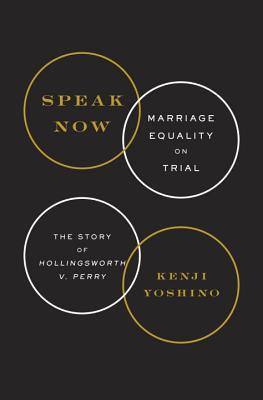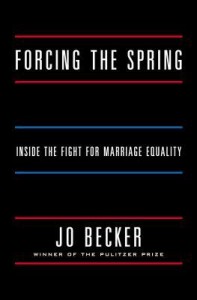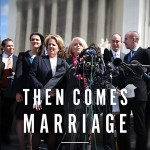 Format read: ebook provided by the publisher via Edelweiss
Format read: ebook provided by the publisher via EdelweissFormats available: hardcover, ebook
Genre: nonfiction, legal history
Length: 336 pages
Publisher: Crown
Date Released: April 14, 2015
Purchasing Info: Author’s Website, Publisher’s Website, Goodreads, Amazon, Barnes & Noble, Kobo, Book Depository
A renowned legal scholar tells the definitive story of the trial that will stand as the most potent argument for marriage equality.
In 2008, California voters passed Proposition 8, rescinding the right of same-sex couples to marry in the state. Advocates for marriage equality were outraged. Still, major gay-rights groups opposed a federal challenge to the law, warning that it would be dangerously premature. A loss could set the movement back for decades. A small group of activists, however, refused to wait. They turned to corporate lawyers Ted Olson and David Boies—best known for arguing opposite sides of Bush v. Gore—who filed a groundbreaking federal suit against the law.
A distinguished constitutional law scholar, Kenji Yoshino was also a newly married gay man who at first felt ambivalent about the suit. Nonetheless, he recognized that Chief Judge Vaughn Walker’s decision to hold a trial in the case was momentous. Boies and Olson rose to the occasion, deftly deploying arguments that LGBT advocates had honed through years of litigation and debate. Reading the 3,000-page transcript, Yoshino discovered a shining civil rights document—the most rigorous and compelling exploration he had seen of the nature of marriage, the political status of gays and lesbians, the ideal circumstances for raising children, and the inability of direct democracy to protect fundamental rights. After that tense twelve-day trial, Walker issued a resounding and historic ruling: California’s exclusion of same-sex couples from civil marriage violated the U.S. Constitution. In June 2013, the United States Supreme Court denied the final appeal in Hollingsworth v. Perry, leaving same-sex couples in California free to marry.
Drawing on interviews with lawyers and witnesses on both sides of the case, Yoshino takes us deep inside the trial. He brings the legal arguments to life, not only through his account of the case, but also by sharing his own story of finding love, marrying, and having children. Vivid, compassionate, and beautifully written, Speak Now is both a nuanced and authoritative account of a landmark trial, and a testament to how the clash of proofs in our judicial process can force debates to the ultimate level of clarity.
My Review:
The title of this book is taken from the familiar traditional marriage ceremony. You know exactly where, too. It’s that famous, or infamous, point in the ceremony where the officiant asks whether anyone in attendance, “has reasons why these two should not be married, speak now or forever hold your peace.”
In fiction, it’s a dramatic moment, in real life, almost a joke. But in the case of marriage equality, there are all too many forces arrayed that would jump up and say that they have reasons why two men or two women should not be able to marry each other, and have spoken at length and sometimes with great emotion. And at other times with extreme malice. Or to use the legal term, animus.
 Speak Now covers the same ground as last year’s Forcing the Spring (reviewed here), but through a much different lens.
Speak Now covers the same ground as last year’s Forcing the Spring (reviewed here), but through a much different lens.
Forcing the Spring was written by an embedded journalist in the fight to overturn California’s Proposition 8, the state constitutional amendment that made same sex marriage illegal in California, after a landmark court decision that found such bans to be unconstitutional, and after many thousands of marriages had been performed while the legal window was opened.
The case against Prop 8 intended to push that window open again, and keep it open, by going all the way to the Supreme Court if necessary. Which, of course, it was.
Where Forcing the Spring reads like a legal thriller, Speak Now is written from the point of view of someone who is both a legal expert and is personally affected by the outcome of the case. So there are both more personal reflections included in this narrative, and more legal analysis.
Don’t let the thought of that legal analysis put any reader off – it is thorough, well-done, and especially accessible to the lay reader. At the same time, the author makes it very clear just how different the conduct of this case turned out to be. The author, as a lawyer himself, shows both his fascination with the process in general, and his enjoyment of the trial process in this case. We are able to see through his eyes both how unusual it was, and how much the trial process itself affect the outcome.
The trial process forced everyone on both sides to subject their contentions to rigorous investigation by opposing counsel. In a trial, you can’t just say something is true, you have to prove it. And the separation of church and state is still considered important. So that religious grounds for banning same-sex marriage do not hold up. The “why” of a thing has to be something that the state (meaning the government) has a reasonable interest in. And the government cannot have a reasonable interest, or any interest, in religion.
As a look into how the legal process can work to protect the rights of a minority against oppression by the majority, this is a beautiful case of our legal process at work.
Even those who disagree with the outcome will find the process of the case itself fascinating.
Reality Rating A: In light of the Supreme Court oral hearings last week on the subject of marriage equality in the U.S. Sixth Circuit (Kentucky, Michigan, Ohio and Tennessee) in the case of Obergefell v. Hodges, this seemed like a good time to look at this topic again. Speak Now turned out to be a terrific choice, one that covers what is now a familiar case from a different perspective than the more popularized version in Forcing the Spring.
As a lawyer himself, the author dives more deeply into the legal process of the case, and shows clearly how well the trial process worked in this case, and why. He also makes it plain that he likes and enjoys the trial process in general, and his opinion that the requirements for proof of any assertions in a trial is one of the cornerstones of our justice system. And he makes this one particularly fascinating.
The author personalizes the story by letting readers see its effects on him, his family and his life, and how the personal stories of the plaintiffs in the case both moved him and resonated with him, his husband and their two children. The landscape of marriage equality has changed a great deal in a relatively short period of time. Both the author’s family and this case are emblematic of that change.
By the end of June, we will all know how the current case has been decided. As we wait, reading this book provides insight into how we reached this point as a nation.






